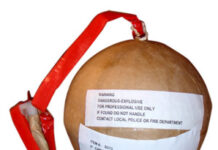By Mary Hoar, President Emerita Yonkers Historical Society, recipient of the 2004 Key to History and President Untermyer Performing Arts Council

Monday, March 28th
March 28, 1951: Two twelve-year-old boys found $33,736.25 while exploring the old Bigelow mansion on Hawthorne Avenue! Thomas Novak and Alfred Graves, also Hawthorne Avenue residents, found the bundles of currency and gold coins in three cans hidden under the house eaves. Six months earlier workers found $25,000 hidden in the home. Commissioner William Comey announced Yonkers police would guard the house to prevent trespassers from conducting their own search.
Agnes Edgar Bigelow, the first Yonkers woman to fly in an aeroplane, died eight months earlier. Her father was a founder of Archer, Edgar, Merrill and Condit, the successful wholesale and retail grocery store; its building at the foot of Main Street is the location where the Post Office stands today.
The 14-room home at 204 Hawthorne Avenue was razed soon after their discovery… but not before it was painstakingly searched “board by board” for more hidden treasure.
Tuesday, March 29th
March 29, 1951: Yonkers Public Safety Commissioner Patrick O’Hara announced he had not received an answer to his telegram to New Hampshire Senator Charles Tobey, a Republican serving on the Kefauver Crime Investigation Committee. Tobey told DC reporters he received an unsigned threatening letter with a Yonkers postmark, but didn’t remember what the letter said. As soon as this news reached Yonkers, Councilman Michael Nugent introduced a resolution urging the Kefauver Committee to continue investigating while keeping the public aware of the “sinister influences threatening our democratic way of life.” It passed the Yonkers Council unanimously.
March 29, 1956: While speaking to the Yonkers Public Library Staff Association, free lance writer, author and Yonkers resident Walter Daniels were told staff could fight book censorship and should “stand up for their choice” if they had backing from their fellow librarians and the Library Director.
Wednesday, March 30th
March 30, 1935: Yonkers rising baseball umpire Bill Grieve signed a new contract and changed his league! He had worked with the Northeastern League; he now would officiate in the Class A New York-Penn League. A career advancement, Grieve was assigned to work with the two leading teams of the eight-team circuit, Scranton and Wilkes-Barre. The other teams in the league were Binghamton, Elmira, Harrisburg, Hazleton, Reading and Williamsport.
March 30, 1946: Stephen Lee Senigo, the first British war bride baby born in Yonkers, was delivered at Yonkers General Hospital. Proud papa was Mark Senigo, sports editor for the London edition of Stars and Stripes, and, in civilian life, was a rewrite man for the Religious News Service in New York City.
March 30, 1955: Mayor Kris Kristensen officially dedicated the new Cross County Hospital and Medical Center at Central Park Avenue and the Cross County Parkway.
Thursday, March 31st
March 31, 1926: Pioneer merchant Charles Culver of 249 North Broadway passed away. He was the owner of the first big store in Yonkers, Culver’s Department Store. And built and owned the building at 5-7 Main Street, while operating a Peekskill clothing factory. When he retired in 1906, the site became the Marshall-Matheson Company. He “turned his attention” to his warehouse, converting it to the Westchester Storage Warehouse on Nepperhan Street.
March 31, 1925: Health Commissioner Clarence Buckmaster ordered contractors to use only hard coal instead of soft coal in their stationary engines. He hoped this not only would eliminate pollution and a whole lot of the complaints people called into his office.
Friday April 1st
April 1, 1911: Workers began restoring the exterior of Manor Hall to return the Hall to its original pre-Revolutionary appearance. Work on the interior could not begin until the City Clerk’s office was moved out of Manor Hall to the new City Hall.
April 1, 1943: Twenty-two year old Staff Sergeant Albert DePew of Yonkers, USA Air Forces, wrote to The Herald Statesman. Stationed at Greenville Army Air Base with a bombardment group, he shared proof of our city’s active part in the country’s war effort. A crew chief commanding a ground detachment, DePew found a plaque on a new North American B-25 medium bomber inscribed with dozens of names of people who paid for the plane by purchasing War Bonds. On closer inspection, he found names of five Yonkers residents on the plate: Harry Lacey, Mr. and Mrs. M. Walsh, Sidonie Howard and Mary LaBelle. He gave his thanks for their contribution, and said he hoped to find many more names of Yonkers people, “carried with these ships into combat.”
Saturday, April 2nd
April 2, 1926: Health Commissioner Clarence Buckmaster announced Yonkers did not need to fear milk; milk inspector Chris Sheridan and assistant George Gillespie were working day and night to prevent “bootleg milk” or improper milk, from coming into Yonkers.
April 2, 1936: Close to one thousand High School of Commerce students attending classes at Yonkers High School in the afternoon, again asked the Board of Education to switch their schedule with the regular Yonkers High School students. The students attended on a split session; the academic or Yonkers High School students attended from 8:00 am to 12:30 pm, while the Commerce students attended from 1 to 5:30 pm. The petition stated the afternoon sessions “deprived them of valuable employment opportunities.”
Sunday, April 3rd
April 3, 1911: Justice Joseph Morschauser announced if the Board of Supervisors did not give him a White Plains court to hold a Special Term of Supreme Court, he would hold it in the courtroom at the new City Hall at Yonkers.
April 3, 1917: More than two hundred men and women from the Grey Oaks, Nepperhan Heights and Bryn Mawr sections formally organized a Home Guard for their area of Yonkers; Norman McDonald was elected President.
Questions or comments? Email YonkersHistory1646@gmail.com.
For information on the Yonkers Historical Society, Sherwood House and upcoming events, please visit our website www.yonkershistoricalsociety.org, call 914-961-8940 or email yhsociety@aol.com.





